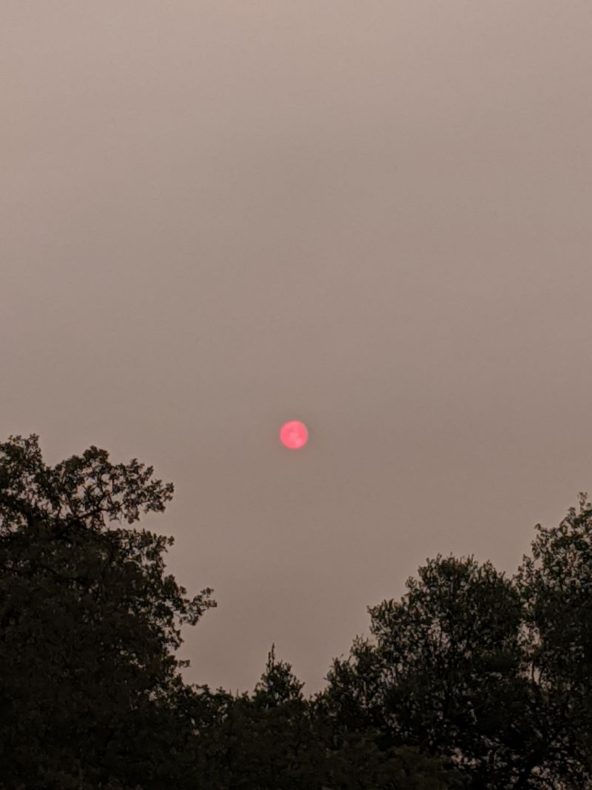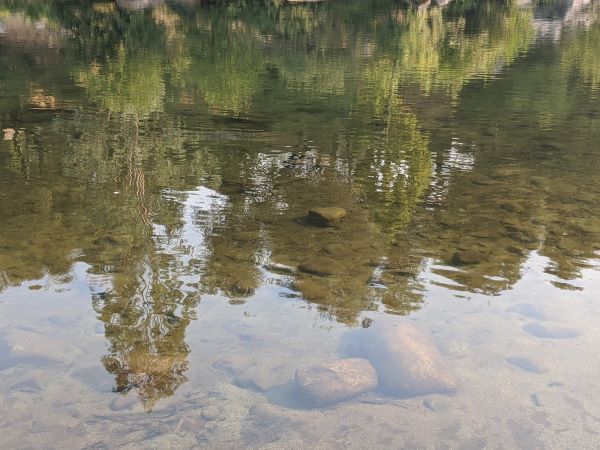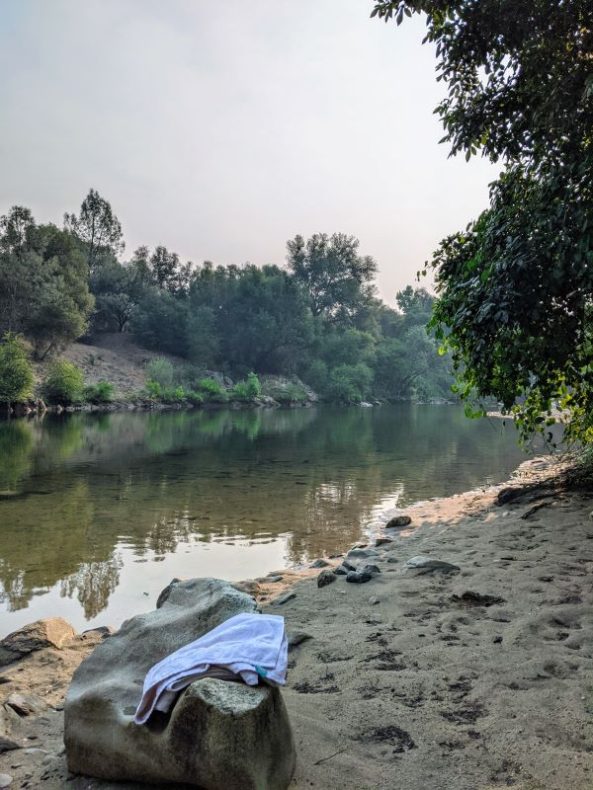
It’s tricky, trying to understand a crisis when you’re in it. How invasive it can feel to read apocalyptic headlines about your home, like having overwrought, uninvited strangers show up to a family funeral. So terrible, so shocking, people say, snapping photos. People are sorry about the wildfires ravaging northern California right now, again, but one sometimes gets the sense that the world is also kind of disappointed in California, too, by how far the golden state that “perfected if not invented the American summer” has let herself go.
A few years back I started keeping a journal that stacks entries one on top of the other, year by year, so that I on any given day I can see what I was doing and thinking about one, two, three years ago. The summer/fall entries are getting repetitive: fire, fire, fire. One friend just lost her hometown, Greenville, to the Dixie Fire, now the second largest wildfire in California history. “We see our pain reflected on the front page of the New York Times,” she wrote. “We see the homes of our loved ones on the nightly news. And yet, there is no help coming.” (Here is one link to help. We also need federal and state governments to ramp up prescribed burns, cultural burning, and thinning to around 2 million acres per year.)
Another friend has spent most of the summer tending firehoses. She recently found herself driving an excavator, flames erupting around her. She describes the vendors who show up at every big fire to hawk T-shirts, their pop-up tents barely visible through the smoke. All the firefighters buy them, like concert goers. Watching a parade of tourists float down the river in yellow rafts and inner tubes under a grimly smoky sky just after the IPCC report comes out, I find myself imagining the rafter as passengers on the Styx, on a deeply discounted Groupon adventure to the underworld. I call my sister, who is similarly cracked, and she suggests that I go swimming, and it reminded me of this post. I’ve been neglecting my swimming routine lately, and it shows. As the wise Cameron Walker knows, it’s time to get back in the water.
The post below first ran in August 2020.

The slow stretch of river where I like to swim gleamed copper yesterday morning, reflecting sunlight tinted red by wildfire smoke. I sat and drank my coffee as the sun rose, watching the silhouette of a hummingbird zip across the dun-colored sky.
Four mergansers cruised across the pond then dove underwater, leaving barely a ripple behind them. “Must be nice to be a boat, a plane, and a submarine,” a friend who’d stopped to watch the ducks said. We chatted for a minute about loss and transition, about the hundreds of too-close-to-home wildfires in California and the triple digit heatwave fueling them. “I came here to swim,” I told him. “That’s how I’m dealing with this.”
The water in the river stays cold all summer, stored in an upstream reservoir. When the weather gets hot, dam operators release more water to generate power for air conditioners. This week, as you’ve probably heard, temperatures vaulted past historic records, and the demand for power threatened to overwhelm the state’s electricity system, prompting rolling blackouts. To keep our energy bill down and preserve my sanity I’ve been attempting to remain in a state of near-hypothermia, starting each day with a cold morning swim.

This morning I stood at the water’s edge for several minutes, debating whether to go all the way in. The water was cold enough to make my foot bones ache, and I dreaded the brain-freeze that would come when I submerged my head.
Then a hot, hair dryer-like wind blew up the canyon. I caught the scent of late-August blackberries, so ripe now they’ll fall apart in your fingers as you pick them, and of evening primroses, a fragrant, pale yellow flower that opens at sunset and closes at dawn. The chorus of birds got louder; I set my stopwatch and dove in.
I won’t try to convince you that cold water swimming is good for your health. So far as I can tell there’s not much evidence for it, beyond exercise’s usual salutatory effects. It’s dangerous to swim in a river without a life jacket (I wouldn’t do it if the current was any stronger), and given the river’s less-than-pristine condition, one of these days I’ll probably step on a fish hook or get an ear infection.
But I can attest to river swimming’s many pleasures, after the pain of immersion ends. Sometimes I swim with my head above the surface, watching the water ripple gold with a dusting of pollen and goose feathers. Other times I dive below, opening my eyes to explore the river bottom. The water is bottle green and clear in places and murky in others, with submerged boulders that loom up suddenly from below. Fish flash and flop, herons alight. When the summer crowds recede, I’ll sometimes see an otter or a beaver.
Things look better at otter-level, even if the sky is full of smoke and ash. If I stay in the water long enough, usually about 20 minutes, my thoughts slide into a much more manageable orientation. (Never mind that when I got out of the water yesterday, my hands were too numb to tie my shoelaces.)
Air conditioning may cool my skin, but river swimming chills my brain, my skeleton, my viscera. It can make things clearer: In one of my favorite films, a Czech movie called Ice Mother, a woman who has spent too many years putting up with her self-involved sons and a not-so-inspiring late husband joins a polar bear club. She falls in love with a barrel-chested man who lives in a van with his pet chickens, and makes her children treat her better. It is precisely my kind of film, full of hope and lumpy bodies, in part because it (spoiler alert) does not end in a cozy romance, but a bracing solo swim.
As hundreds of fires burn across California, I find I’m needing the kind of sang-froid that will let me walk down the highway in triple digit heat with goosebumps on my skin. Last weekend we had our second evacuation scare in a month. It was 105 out, windy, and I couldn’t think. I had a list of what to pack but couldn’t stick to it. Instead I started cramming the car with objects of mostly sentimental value: A guitar I barely play, old journals, clothes I bought before the pandemic but have had no opportunity to wear. “I really like our life,” I said to Pete, unable to decide whether to pack our ratty old bedspread. “I want to keep it.”
Of course, life is not an old bedspread or a guitar, and when I’m in my right mind I know that. Last month, to celebrate my mom’s birthday, my sister and I took her on a mellow little river trip, essentially a masked blackberry-picking mission. As we came round a river bend we saw a black column of smoke snaking up from a location that looked disturbingly close to my house. We paddled closer, ash falling like snow on the river, and saw that although my house was not burning, the fire was less than a mile away.

I dunked my head in cold water, then ran. My fiance had already safely evacuated with our kitten, and my sister helped me put a sprinkler on the roof. Instead of indecision I felt sharp joy that everyone was safe. I put a couple of valuables in a waterproof bag. “Do you need anything else?” my mom asked, as we headed back to the river. “No,” I said, and meant it.
Oh! I will be inspired by you! My swim buddy went out of town in June and I haven’t been since.